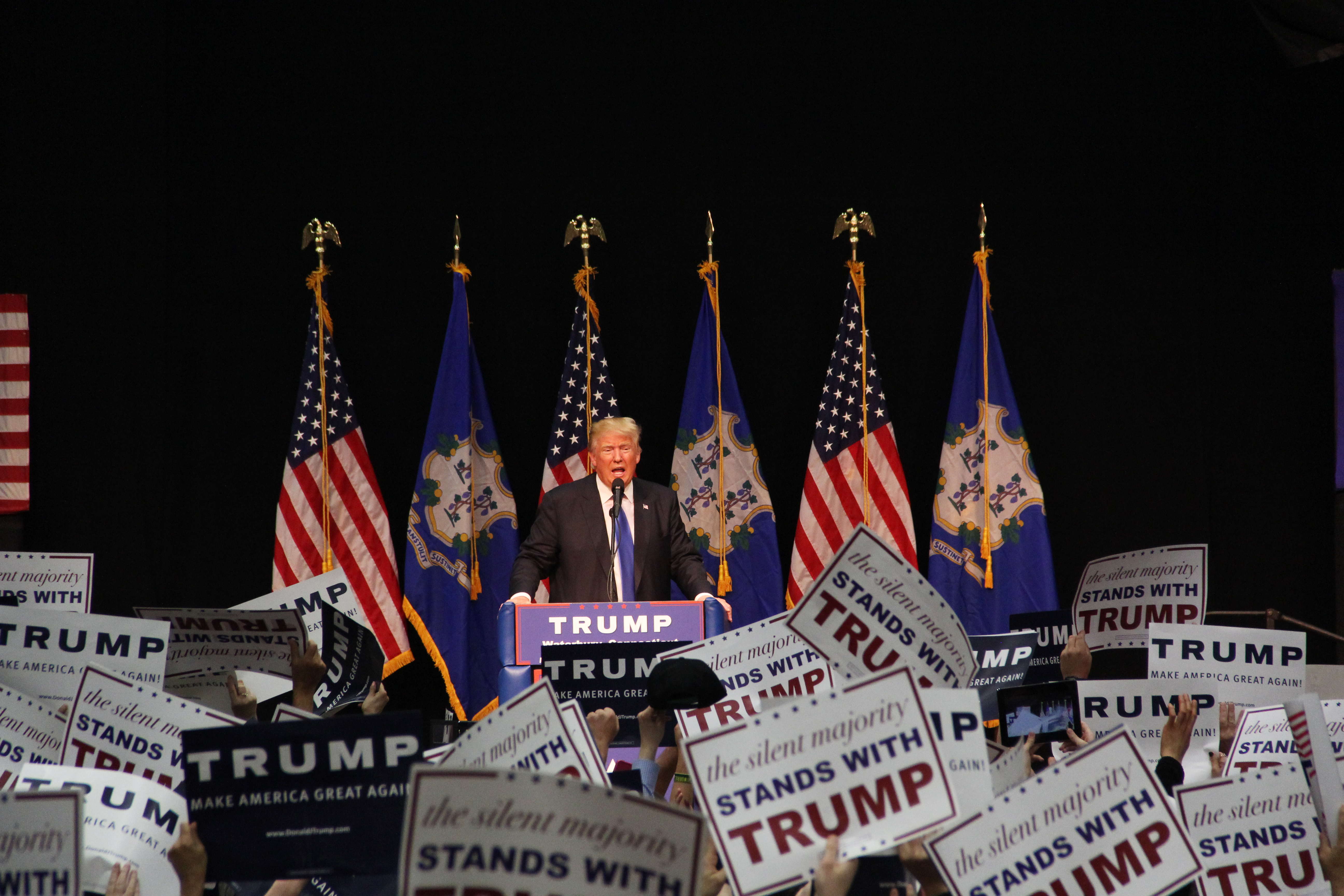Donald Trump elected 47th president
Eight years after first winning the presidency, Donald Trump will return to the nation’s highest office. JD Vance LAW ’13 will become Yale’s fourth vice president.

Amy Cheng
Former President Donald J. Trump has won the presidential election and will become the 47th president of the United States. He defeated Vice President Kamala Harris with at least 277 electoral votes and flipped at least three tossup states that he previously lost in 2020.
At 5:34 a.m. Wednesday, the Associated Press called Trump’s victory, as the former president had secured the 270 electoral votes needed to win with his triumph in Wisconsin. The former president is also currently projected to become the first Republican presidential candidate to win the popular vote since 2004 and the first president to win two non-consecutive terms since the 19th century.
Trump celebrated his triumph before any major news organizations called the race. At 2:30 a.m., he declared victory in a speech to supporters in Palm Beach, Florida. Harris has yet to concede.
“America has given us an unprecedented and powerful mandate,” Trump said in his speech.
Republicans flipped control of the U.S. Senate, possibly gaining the most seats the party has had in the Senate since 2014. The control of the House of Representatives is not yet decided, as results in many districts are expected to be close.
Republicans picked up votes in both swing states and solid red and blue states compared to 2020. More than 90 percent of the counties shifted in favor of Trump as of Wednesday morning, and he is likely to win all seven swing states.
Trump’s running mate, JD Vance LAW ’13, said that Trump’s victory is “the greatest political comeback in American history.”
Vance will become the fourth Yale graduate to hold the vice presidential seat. Despite Vance’s ties to Yale, however, few in the community — where, according to the News’ survey, only about eight percent of students planned to vote for the Republican ticket — are likely to celebrate his political ascend.
As the country grapples with the prospect of a second Trump presidency, the outcome is set to send shockwaves through the overwhelmingly liberal Yale and New Haven communities.
Yale in anticipation of the results
“I wonder how the Yale Dems are doing. I want to see if they’re in tears by now,” Manu Anpalagan ’26, president of the Yale College Republicans, said at the watch party on Tuesday night, expecting Trump’s win. Anpalagan later said he was joking as a reference to the 2016 Yale Dems reaction.
As the night drew on, Anpalagan grew more and more confident that Trump would win.
At watch parties hosted by Yale Democrats, Harris supporters went from cautiously optimistic to grim as the night progressed.
“We’re all feeling scared because the impact of Trump getting elected is going to affect so many people here,” Zach Pan ’27, who volunteered on three Yale Dems canvassing trips to Pennsylvania, said before the race was called. “We’re scared for the immigrants he’s going to target. We’re scared for the opposition that he claims he will prosecute. We’re scared for our democracy.”
The News previously reported that Trump’s victory would put into question Yale’s federal research funding, students’ access to reproductive healthcare and the future prospects of international students.
Several students on and before Election Day also shared concerns about Trump’s rhetoric surrounding democratic norms and actions during the Jan. 6, 2021, U.S. Capitol attack.
“Trump incited a mob that attempted to overthrow democracy, and even as it came close to harming elected officials, including his own vice president, he stood there and watched. It is not the character or policy that any American should expect from an elected official. It is absolutely disqualifying,” Giuseppe DiMassa ’28 told the News in October.
New Haven braces for impact
On Tuesday, before polls closed, New Haven Mayor Justin Elicker told the News that Trump’s victory “would be a disaster for our city.” He expressed worries for the New Haven immigrant community and the federal funding the city relies on.
“These results are disappointing, and I believe a true setback for our country on its long and winding road towards a more perfect union,” Elicker wrote in a statement Wednesday morning. “However, just like when Donald Trump was president before, we will once again come together as a city to stand up for what is right and just.”
At the polls, many New Haven residents echoed Elicker’s concerns. In a city that gave almost 80 percent of the vote to Harris, residents turned out in support of the vice president and were against Trump’s policies on immigration and reproductive rights.
Multiple New Haven Harris voters highlighted Trump’s anti-immigrant rhetoric, which has intensified in recent months. Emilio Rivas, a Republican and first-generation Cuban American, attributed his vote for Harris to Trump’s “demeaning” descriptions of Latinos.
In conversations with the News before the election, immigration attorneys and activists predicted the intensification of Trump’s restrictive first-term immigration policies in his second term. While the attorneys and activists were “caught off guard” when Trump first won in 2016, they had been preparing for his possible second term, mainly improving cooperation to better support immigrants.
“I’d like to tell people that [Democrats] shouldn’t be anxious about a Donald Trump win, but I think that they should,” Sen. Chris Murphy said before the election was called.
Those who voted for Trump in New Haven expect the economy to improve under his presidency, citing the increased cost of living under the Biden administration. Christina Cruz, a Trump voter, said on Tuesday that Harris, a member of the current administration, “hasn’t done anything” while in power.
Maia Nehme, Ethan Wolin, Elijah Hurewitz-Ravitch, Asher Boiskin, Baala Shakya and Yurii Stasiuk contributed reporting.
Correction, Nov. 14: This story has been updated with proper attribution and context for a quote.
Interested in getting more news about New Haven? Join our newsletter!







